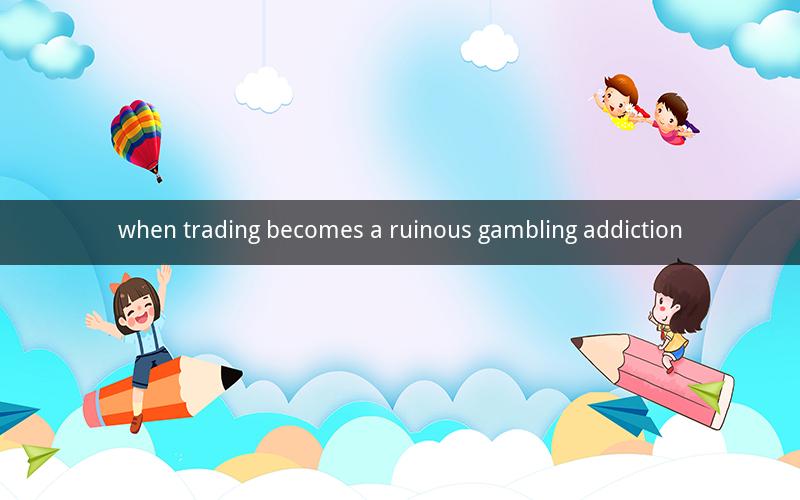
When Trading Becomes a Ruinous Gambling Addiction
Table of Contents
1. Understanding the Dangers of Trading Addiction
2. Symptoms of a Trading Addiction
3. The Psychological Underpinnings of Trading Addiction
4. Financial Consequences of Trading Addiction
5. Coping Strategies for Trading Addiction
6. Professional Help for Trading Addiction
7. Support Systems for Trading Addiction
8. The Importance of Self-Reflection in Overcoming Trading Addiction
9. The Role of Education in Preventing Trading Addiction
10. The Future of Trading Addiction Prevention
1. Understanding the Dangers of Trading Addiction
Trading, once a profession rooted in strategy and discipline, has become increasingly accessible with the advent of online platforms. However, for some individuals, the thrill of potentially making significant profits can lead to a gambling addiction that ruins their financial and personal lives.
2. Symptoms of a Trading Addiction
Identifying trading addiction can be challenging, as it often manifests in subtle ways. Some common symptoms include:
- Compulsive need to trade, even when there are no significant opportunities.
- Neglecting other responsibilities and activities to trade.
- Experience of emotional turmoil and anxiety when unable to trade.
- Increasing risk levels and ignoring stop-loss orders.
- Financial strain due to excessive trading losses.
3. The Psychological Underpinnings of Trading Addiction
Trading addiction can stem from various psychological factors, such as:
- The thrill of potential profits and the associated adrenaline rush.
- The need for control and predictability in a world of uncertainty.
- The desire to escape from personal problems or boredom.
- The belief that trading is a guaranteed path to wealth.
4. Financial Consequences of Trading Addiction
The financial impact of trading addiction can be devastating. Some consequences include:
- Draining personal savings and retirement funds.
- Accumulating significant debt due to margin trading or borrowing to trade.
- Loss of investment opportunities and potential future wealth.
- Damage to creditworthiness and financial reputation.
5. Coping Strategies for Trading Addiction
To cope with trading addiction, individuals can adopt several strategies:
- Establish a trading schedule and stick to it.
- Set realistic financial goals and monitor progress.
- Utilize stop-loss orders and avoid chasing losses.
- Seek support from friends, family, or a support group.
6. Professional Help for Trading Addiction
Seeking professional help is crucial for overcoming trading addiction. Some options include:
- Therapists specializing in addiction and mental health.
- Financial advisors to help rebuild a solid financial foundation.
- Joining a self-help group or support network for traders.
7. Support Systems for Trading Addiction
Creating a support system is vital for recovery. This may include:
- Financial advisors to help manage finances.
- Friends and family members who understand the struggles and can offer emotional support.
- A mentor or coach to provide guidance and encouragement.
8. The Importance of Self-Reflection in Overcoming Trading Addiction
Self-reflection is an essential tool for overcoming trading addiction. This involves:
- Identifying the underlying psychological factors driving the addiction.
- Recognizing the negative consequences of trading addiction.
- Developing a plan to address these issues and prevent relapse.
9. The Role of Education in Preventing Trading Addiction
Education plays a significant role in preventing trading addiction. This includes:
- Learning about the risks and rewards of trading.
- Understanding the importance of discipline and risk management.
- Developing a trading plan based on solid research and analysis.
10. The Future of Trading Addiction Prevention
The future of trading addiction prevention lies in:
- Increased awareness and education about the risks of trading addiction.
- Improved support systems for those struggling with addiction.
- Enhanced technology and tools to help manage trading behaviors and minimize risks.
Frequently Asked Questions and Answers
Question 1: How can I tell if I have a trading addiction?
Answer: If you find yourself compulsively trading, neglecting responsibilities, and experiencing financial strain, it's possible you have a trading addiction.
Question 2: Is it possible to overcome a trading addiction?
Answer: Yes, it is possible to overcome a trading addiction with the right support and strategies.
Question 3: How can I establish a trading schedule?
Answer: Create a consistent schedule for trading and stick to it, ensuring you allocate time for other activities and responsibilities.
Question 4: What are some coping strategies for trading addiction?
Answer: Some coping strategies include setting realistic goals, utilizing stop-loss orders, and seeking support from friends, family, or support groups.
Question 5: Can a therapist help with trading addiction?
Answer: Yes, a therapist specializing in addiction and mental health can provide guidance and support for overcoming trading addiction.
Question 6: How can I manage my finances after a trading addiction?
Answer: Seek the help of a financial advisor to help manage your finances and rebuild a solid financial foundation.
Question 7: Are there any support groups for trading addiction?
Answer: Yes, there are self-help groups and support networks for traders struggling with addiction.
Question 8: What role does self-reflection play in overcoming trading addiction?
Answer: Self-reflection helps individuals understand the underlying psychological factors driving their addiction and develop a plan to address them.
Question 9: Is education important in preventing trading addiction?
Answer: Yes, education helps individuals understand the risks and rewards of trading, enabling them to make informed decisions and develop a disciplined approach.
Question 10: What is the future of trading addiction prevention?
Answer: The future of trading addiction prevention lies in increased awareness, improved support systems, and enhanced technology and tools to help manage trading behaviors.